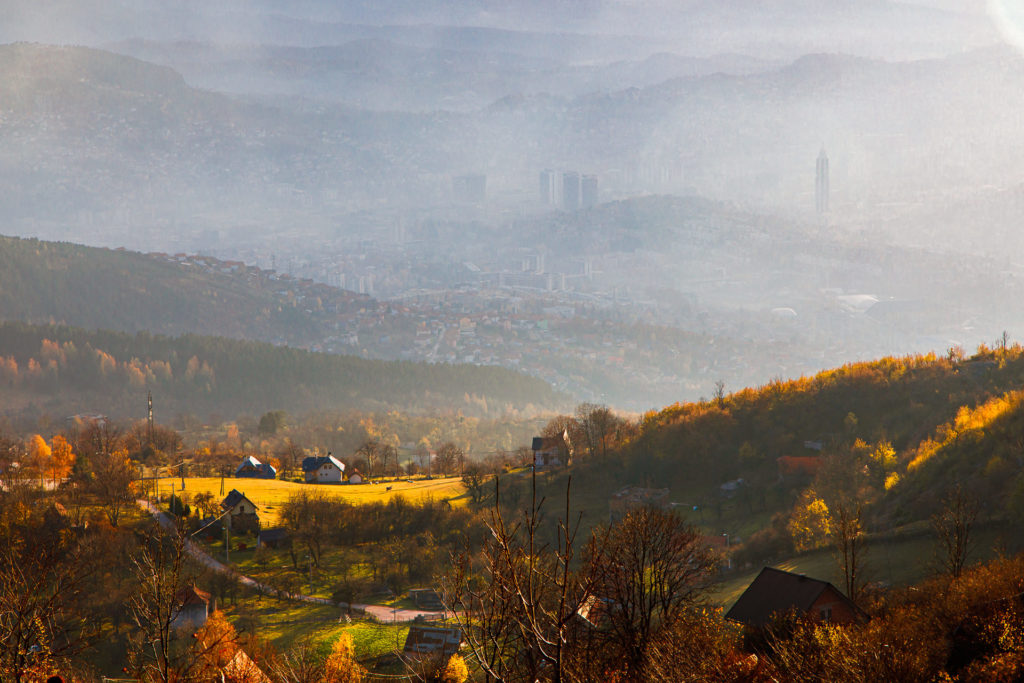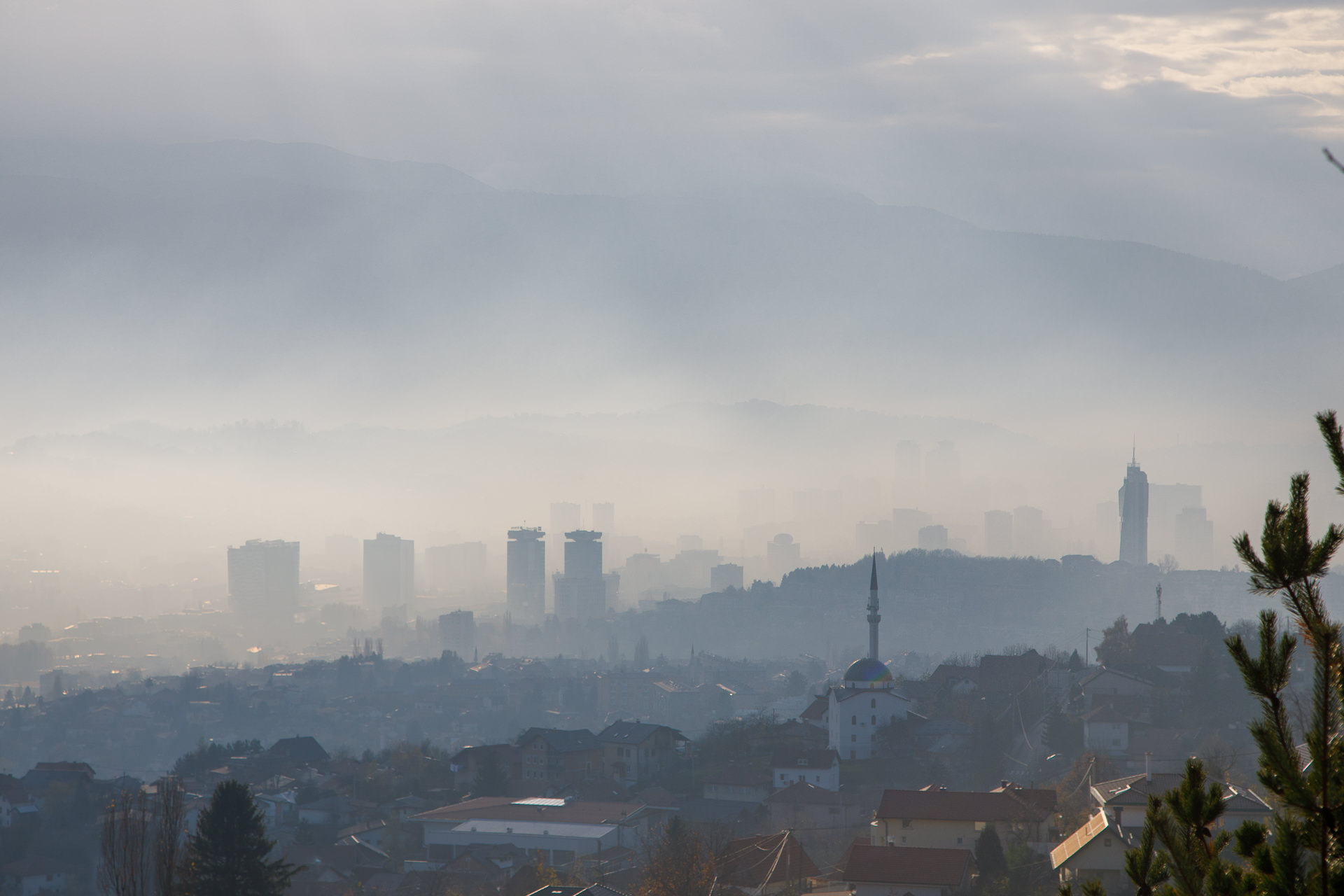Problems related to air quality, energy and climate change have affected Bosnia and Herzegovina for a long time. The excessive consumption of fossil fuels is heavily contributing to these problems. Early this year, BiH embarked on a process to develop an Environmental Strategy and Action Plan for the period of 2030 onwards (BiH ESAP 2030+). Within this process a range of environmental topics in the country are assessed – air quality, energy and climate change being one of them.
We met with with Prof. Azrudin Husika, PhD and Prof. Goran Trbić, PhD, BiH experts covering this area in the process, to talk about the problems as well as available solutions.

What are the biggest challenges BiH is currently facing in the field of air quality, energy and climate change in BiH? What are the root causes of these challenges?
The burning of fossil fuels pollutes the air and emits carbon monoxide which is the main driver of climate change. In this regard, one of the main challenges is to decarbonise the process, more specifically to transition from fossil fuels to alternative sources of energy, primarily solar and wind energy. Given the current economic circumstances, and the fact that individual stoves are the major contributors to air pollution in several communities, it will be particularly challenging to implement mechanisms which will reduce pollutant emissions from individual stoves.
Other options are also available, such as energy efficient buildings, district heating, application of heat pumps or natural gas, but it is challenging to find a way to increase energy efficiency through subsidies, and make other options affordable for citizens. It should be noted though that energy product prices as such must not be subsidized, because this encourages irrational energy consumption.
A further challenge that needs to be addressed is how to reduce emissions from large facilities, which is a commitment made by BiH, and which requires significant funds. Key problems in the transport sector are the aging vehicle fleet and traffic management in many communities, including underdeveloped public transport.
What is the correlation among these three concepts – air quality, energy and climate change, and why are they grouped together in the BiH ESAP 2030+ strategy?
Air quality, climate change and energy are interlinked and interdependent, and practically combined into one system. A change of any of these three segment triggers a chain reaction and further changes in the system, and consequently further environmental harm and pollution. Energy production is the major source of pollutant emissions such as particular matters, sulphur dioxide, nitrogen oxides, etc. In BiH, 75% of greenhouse gas emissions originate from energy production (including transport fuels). Energy efficiency with the application of renewable energy sources is a solution that should be implemented in most communities here.
Given the potential renewable energy sources available in BiH, the best investment opportunities include investments into wind parks and solar photovoltaic power plants. These technologies already reached a development stage where no subsidies are required for relatively large plants, in other words they are market competitive.
The problem of poor air quality has been prevalent in certain urban areas of BiH for many years. Which areas of BiH are most affected by pollution and how does air pollution affect human health? What are potential solutions to this problem?
The major industrial cities are most affected by air pollution: Sarajevo, Tuzla, Zenica, Banja Luka, Lukavac, Kakanj, Bijeljina etc. Air pollution has an extremely adverse effect on the entire population of these cities, especially on people with health problems (cardiac, pulmonary, neurological, etc.). Fine particulate matters have particularly adverse effect on human health. According to a report of the World Bank Country Office in Sarajevo, air pollution in most of the cities in BiH is responsible for three thousand premature deaths annually.
The problems are rather complex, hence potential solutions too. It is necessary to primarily focus on reducing air pollutant emissions. Some solutions include energy efficiency measures applied to residential buildings, where this is possible – upgrading and building district heating systems. Where it is not possible to build a district heating system, energy efficiency measures should be accompanied with efforts to encourage the use of natural gas, certified pellets, heat pumps and solar energy with the most efficient equipment (condensing boilers, certified boilers, pellet stoves, certified heat pumps, etc.)
Possible solutions in the transport sector include development of public transport, better traffic management (transit options, better flow, restricted traffic zones, etc.), development of bike lanes and renewal of car fleet along with development of infrastructure for electric vehicles. In communities where industry is a prevalent air polluter, it is necessary to upgrade all production processes within a shortest possible period so as to allow use of the best available techniques. This also includes installation of up-to-date equipment for the prevention of pollutant generation and treatment of waste gases. Job preservation efforts must not be an argument for excessive pollution. Currently, all facilities are required to apply the best available techniques for their operations, thus they all operate under equal conditions. The application of the best available techniques improves resource efficiency and strengthens competitiveness of companies, in other words it retains and creates jobs.

According to experts, climate change in BiH will have consequences which will affect all spheres of the society and all industries. How does climate change affect BiH currently and is BiH ready to respond to all challenges?
Climate change severely affects BiH and many economic sectors. Agricultural, water management and energy sectors are particularly threatened, while the pressure on water resources in general is extremely acute. It is important to stress the issue of climate extremes which occur more frequently and with more intensity, in the form of increased floods, draughts or heat waves.
Several infrastructural projects were implemented in the wake of the catastrophic 2014 floods, notably the development of rivers and catchment areas. A lot has been done to improve understanding and raise awareness about the importance of the fight against climate change. However, BiH has very limited capacities in the implementation of many projects aimed at adaptation to climate change. When discussing climate change, it is important to note that the health system is extremely exposed to this change. Capacity building of the health system is a particularly great challenge in circumstances of the COVID-19 pandemic.
What are your proposals and recommendations for improvement of air quality, circumstances in the energy sector, and what can be done to reduce the impact of climate change in BiH?
Air quality improvement, energy transition and mitigation of climate change are interrelated processes. In order for these objectives to be achieved, policy creators and decision-makers need to act as a matter of urgency, but academia and citizens should do the same. Everyone needs to contribute in their own capacity in order for these processes to be successful, in order to provide for the future of the planet Earth and of our descendants.
It should be noted that the proposals and recommendations which, to a great extent, have been included in the responses to the previous questions, lead to a better state of environment, including new sustainable and humane jobs. Consequently, this is about development rather than about obligations and burdens.
It was decided that BiH environmental strategy will be developed using participatory approach, which means that relevant institutions, general public, private sector and civil society organisations, as well as the professional community in BiH will be engaged in the process. Why is the participatory approach important, and how can members of the general public engage in the process?
Participatory approach is important because all the stakeholders have been engaged in the strategy development process from the beginning. This is unlike a traditional approach where stakeholders are invited to provide comments on material prepared by an expert or authority. This approach means that members of the working groups which represent a broad range of stakeholders together define the objectives, targets, measures, etc. of the process.
This increases the likelihood that defined priority measures in the Strategy and Action Plan reflect the needs of different groups of people ensuring that benefits of sustainable development, including environmental protection, are more equally distributed. Furthermore, this approach increases the ownership of the strategy and support to its implementation.
Strategies and action plans for BiH, FBiH, RS and BD are important for environmental protection. Is there a way for BiH citizens to contribute to air quality through their action?
As a rule, strategies and action plans define policies, visions, objectives and measures and address individual problems that pose pressure on the environment. However, commitment and action of individuals aimed at prevention of pollution of the environment is essential. This primarily means rational use of energy and reduced use of fossil fuels, which ultimately leads to reduced air pollution. Having said that, the authorities need to create such situation that it is cost-effective for citizens not to pollute their environment.
In the end, why is it important for BiH to adopt an environmental strategy for 2030+?
It is very important to apply a uniform approach across the levels of government in Bosnia and Herzegovina, and to define problems and offer potential environmental solutions. The strategy will define objectives and provide specific measures to achieve these objectives until 2030 and beyond.
An institution will be assigned to implement each of these measures, and performance monitoring indicators and required funds will be defined for the periods until 2025 and from 2025 to 2030. We will use these to apply for international funds available in these areas. It is common knowledge that only EU designated EUR 9 billion of grant funding for the implementation of the so-called Green Agenda in the Western Balkans. Decarbonisation, e.g. increased use of renewable energy sources, is one of the focuses.

More about the BiH ESAP 2030+ environmental strategy
The primary goal of the BiH ESAP2030+ project is to support the authorities of BiH, FBiH, RS and BD in the ESAP 2030+ development. The ESAP document will comprise environmental strategies and action plans for FBiH, RS and BD, and actions that will be taken at the level of BiH. On a long-term basis, the project will improve the environment in BiH and support BiH on its path to EU membership.
The contents of the BiH ESAP will address the following seven areas of the Environmental Acquis: Water; Waste; Biodiversity and Nature Conservation; Air Quality, Climate Change and Energy, Chemical Safety and Noise; Sustainable Resource Management; and Environmental Management.
The BiH ESAP Project is implemented by Stockholm Environment Institute with the support of the Embassy of Sweden in BiH.







